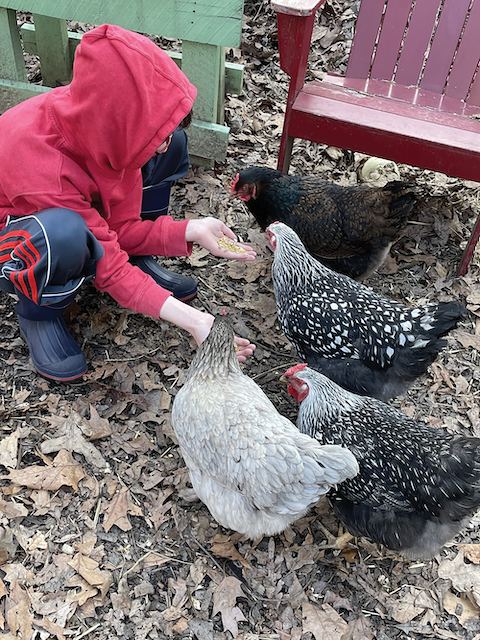Chickening out
Family cares for unusual pets
The Brophys estimate that their chickens produce about six eggs per day.
Every Saturday morning as Jane Brophy grabs a cup of coffee and goes out to sit in her backyard, she hears chickens pecking in her periphery. In addition to five kids, alumnus Samuel (‘21), junior Aaron, sophomore Micah, eighth-grader Rebecca and sixth-grader Ezra, the Brophy family is also home to 11 hens.
The Brophy family first rented chickens in 2015 through the company RentACoop, which allowed them to take care of chickens for a two-month period. They enjoyed it so much that they decided to try it again during the pandemic in 2020.
“If you decided that at the end of your rental time, you wanted to keep the chickens or the coop, your rental fees went towards their adoption fee,” Jane said. “And as a family, we were all like, ‘no, this is so much fun.’ So we started out at that point with two chickens. And now we have 11.”
Besides the regular responsibilities that come with owning pets, the Brophy family also has specific duties they have to complete to take care of their chickens. During the school week, Jane wakes up early to feed them before work, while her kids are responsible for taking care of them at night. They let them into their coops, clean their food bowls and lock the doors to their coop.
“We get eggs every day [and] we have to clean their coops every week,” Micah said. “We had to build them a little pen and we have to make sure it is safe every week.”
Though this would seem like a unique attribute of the Brophy household, according to CBS News, around eight percent of U.S. households had chickens in 2018. Although chickens are not the most popular pets, Jane enjoys their character.
“They’re like little dogs,” Jane said. “I know that sounds really weird. But I’ll come outside, they’ll come running over, they want to … sit on your lap. So they actually have a lot more personality than people think they do.”
Although the family thoroughly enjoys owning chickens, Jane cautions against families getting them for the sole purpose of saving money on eggs. A crucial aspect of taking care of chickens is ensuring that their coops are predator-proof and safe from animals, which requires a large initial monetary investment from the owner. According to Angie’s List, this can cost anywhere between $300 and $2,000. A professionally built coop costs around $650.
“I think the key [to owning chickens] is making sure that you understand the upfront cost,” Jane said. “And if you’re willing to put the time in, the chickens can live for seven to ten years, [then] you’ve got time on your hands, just like with any other pet.”
ESOL teacher Rebecca Reiser is also an owner of a pet chicken. She previously owned five, but unfortunately lost multiple to predator attacks.
“I always wanted to try [owning chickens],” Reiser said. “And I also feel like if I’m going to eat eggs, industrial egg productions can be pretty cruel and not very animal friendly.”
Fresh eggs also have many health benefits as studies show that they have less cholesterol and saturated fat than store-bought eggs, according to Backyard Boost.
These unique benefits aside, Micah says that chickens are enjoyable just like any other pet.
“Not everyone has the chance to actually touch live chickens, but their feathers feel really nice,” Micah said. “And I really enjoy snuggling up with them.”














